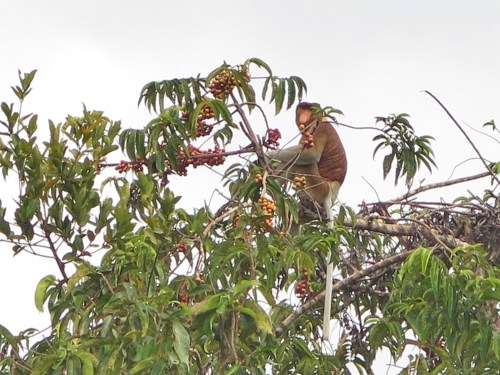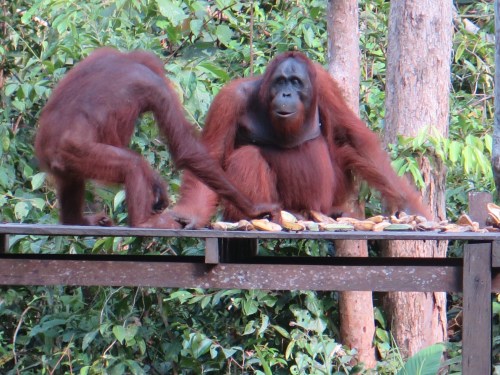The island of Borneo is shared by Indonesia and Malaysia, with the tiny nation of Brunei occupying two small bits in the north. Borneo is rich in oil, coal, tin, diamonds, timber and other resources with ecotourism one of its largest economies. It’s the third largest island in the world with diverse and abundant wildlife and plants, many species, like the proboscus monkeys, only found here. Most important for us is that it’s the only place on earth to find the endangered Bornean orangutans. Sadly, palm oil plantations are causing an alarming loss of the ancient rain forest habitat. Many people fear the orangutans’ days are numbered and that’s why we’re here. As Douglas Adams would say, it may be our Last Chance to See.
The people of this region, called Kalimantan, know what they have and a visit to the orangutans is a well-oiled machine. But happily it’s also charming, personal, warm and most of all, protective of the animals and their precious and beautiful habitat. We didn’t at all feel that the experience has been Disneyfied or rushed, and everyone we came in contact with in planning our trip and on the tour itself was genuinely happy that we are here and went out of their way to make our visit as good as can be.
We arrived in Kumai without reservations late Thursday afternoon and I contacted four tour operators that I’d previously reached out to for info, schedule and cost. Within hours we had a three day, two night houseboat tour booked for the next morning and we scrambled to get the boat buttoned up and our small duffles packed.
By 11am Friday we were underway in the Kumai River, getting to know our houseboat and crew. The boats vary in size and style but are fairly standard in accommodation. Guests occupy the upper deck, with front and back sightseeing decks, a mattress in the middle, and a table and chairs aft. The crew (guide, captain, mate and cook) have the lower deck, including the bridge, sleeping/living quarters, and galley. In the back of the boat are a private bathroom for guests with western toilet, shower and sink, and a crew bathroom. Compared to Escape Velocity this houseboat is luxuriously spacious.

As we chugged up the river to our first stop we enjoyed a yummy lunch of local Indonesian food, freshly cooked with ingredients bought at the market just hours before. We were so hungry that we ate every morsel, which in hindsight must have sent the wrong message to our cook Yana because she upped the quantity in subsequent meals until we were often unable to finish the piles of food she put in front of us.

Our guide Herman (lots of Indonesians have European names, a legacy of 300 years of Dutch rule, I guess) kept a lookout for wildlife while we ate. He signaled Ivan the captain who stopped the boat and often maneuvered toward a better viewing angle for whatever we saw, then waited until we were ready to get underway again. As time went on, Jack and I got better at spotting things too, but Herman, with his repertoire of bird and animal calls, and Ivan with his experience and intimate knowledge of the river, never let us miss an opportunity to see whatever was lurking along the shore or in the canopy above.




In a few hours we arrived, along with a dozen or so other boats, at the first feeding station. A short walk through the forest brought us to a wooden platform where rangers dumped a couple of basket loads of bananas to tempt the nearby orangutans out of the trees. The orangutans aren’t dependent on this feeding, we learned, and in fact if none show up it means they found a more preferred food source elsewhere. Often an alpha male comes to the platform just to find some females and isn’t so much interested in the food as he is in the company. Herman told us the Bornean orangutans are more solitary than their Sumatran cousins, who live closer together for safely because of the threat of tigers.



Before long a few moms and babies showed up, along with an not-too-big alpha male.




While the 25 or 30 guests and our guides watched and snapped away in respectful near silence from crude wooden benches, the captains, mates and cooks socialized boat to boat out in the river. It’s a tight knit community and there’s always a helping hand with docking or mechanical issues or close quarter maneuvering.

At the feeding station we happily watched the orangutans for the entire allowed two hours. Jack and Herman and I were the last to leave.




Back on board we were treated to a chilled wet towel and a frosty Coke, much appreciated in these steamy equatorial afternoons.

For the rest of the daylight we spotted proboscus monkeys and other wildlife until just before dark Ivan and mate Iyeb lassoed a couple of pandanus branches and snugged us close to shore for the night.




Wow! I loved this, and wish we were there to experience it together. It reminds me of walking through the jungle in Panama and seeing and hearing the howlers. Thanks for sharing. XO
We’re leaving Bali tomorrow and are planning on doing a tour. Thanks for sharing info about yours and maybe we will see you soon!
This looks fantastic. We are living in Singapore and would love to experience this. Saw the Orangutans in Sabah but this looks even better. Hope you are heading here as we are hoping to catch up. Janine & Peter
Wow! Read your trio of posts on this trip. Looks awesome! We have yet to make it to Indonesia…. Now all the more so on our bucket list. Thanks Marce & Jack.
Pingback: River dance | Escape Velocity